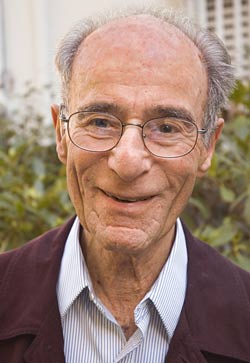UC Berkeley Press Release
Thomas G. Rosenmeyer, professor of Greek and comparative literature dies
BERKELEY – Thomas G. Rosenmeyer, a professor emeritus of Greek and of comparative literature at the University of California, Berkeley, died at his home in Oakland on Feb. 6. He was 86.
 Thomas Rosenmeyer (Genevieve Shiffrar photo) |
Rosenmeyer was born in Hamburg, Germany, on April 3, 1920. He fled to England in the late 1930s and studied at the London School of Economics until he was interned there along with other German nationals and Jewish men. Later, he was transferred to an internment camp in Canada.
After his release, he was admitted to McMaster University near Toronto, where he completed his undergraduate degree in classics in 1944. He earned a master's degree, also in classics, at the University of Toronto in 1945 and went on to do his doctoral studies at Harvard University, receiving his degree in classical philology there in 1949 with a dissertation on Plato.
After teaching classics at the State University of Iowa (1947-52), Smith College (1952-55), and the University of Washington (1955-66), he arrived at UC Berkeley in 1966, taking a joint position in classics and comparative literature. He immediately became one of the main shaping forces of that new, and soon preeminent, program, said Mark Griffith, UC Berkeley professor of classics.
At UC Berkeley, Rosenmeyer was admired and loved as a deeply learned, wide-ranging and loyal colleague, a warm friend and mentor, contributing to his two departments and to the humanities. He served terms as chair of each department and, as acting dean of humanities, helped to organize what is now the Townsend Center for the Humanities. In 1990, he was selected by the Berkeley Division of the Academic Senate to deliver one of the Faculty Research Lectures, an annual series established in 1912 to honor the distinguished work of the faculty.
Upon his retirement in 1990, Rosenmeyer received the Berkeley Citation, the highest award available to a UC Berkeley faculty member, for a distinguished career of teaching, service and scholarship. To mark his 70th birthday that spring, he was presented with a "festschrift" - a collection of papers presented as a tribute to a scholar, with contributions from friends, colleagues and former students.
As a scholar, said Griffith, Rosenmeyer became one of his generation's leaders in classical Greek literature because of his distinctive combination of traditional philology and flexible, finely-nuanced literary analysis. Rosenmeyer was able to draw skillfully both on philosophically-based aesthetic theory - including German as well as Anglo-American - and on an impressive range of literary-critical models that were the fruit of his wide and deep reading, Griffin said.
In his early career, Rosenmeyer published numerous articles on Plato. His first book, "The Masks of Tragedy" (1963), collected several provocative essays on Greek plays. "The Green Cabinet: Theocritus and the European Pastoral Tradition" (1969), is an "excellent example" of his comparative approach, said Tony Long, UC Berkeley's Irving Stone Professor of Literature. This book, said Long, brings "a wide-ranging chronological and cultural perspective to the study of Greek and Latin poetry, points up interconnections between literature and philosophy, and shows the continuing relevance of the classics for the understanding of later literature."
"The Art of Aeschylus" (1982) is likewise a remarkable tour de force, erudite, sophisticated, and pithily written, said Griffin. In a late turn to Latin literature, "Senecan Drama and Stoic Cosmology" (1989), Rosenmeyer argued for an original thesis concerning the interconnection of stoicism with Seneca's tragedies, Griffith added.
Rosenmeyer's scholarship had many important characteristics, as shown in books and in numerous shorter contributions, such as his chapter on drama in M. I. Finley's "The Legacy of Greece" (1981), and in his work as an editor, said Donald Mastronarde, a UC Berkeley professor of classics. He cited Rosenmeyer's sensitive and provocative attention to the ancient texts in the light of an immense range of ancient and modern literature. Rosenmeyer was recognized for his ability to pinpoint aspects and techniques of Renaissance and of modern texts, which significantly borrow from and continue or consciously modify ancient models, Mastronarde said.
Rosenmeyer's work also displayed an interest in the connections between literature and the contemporary currents of philosophical thought; scrutiny of the interplay and tension between literary theory and literary practice; and openness to the ambiguities and imprecisions of literary expression and the interpretative strategies of scholars, said Mastronarde.
Rosenmeyer's scholarship was acknowledged by two Guggenheim Fellowships, election to both the American Academy of Arts and Sciences and the American Philosophical Society, and his appointment in 1989 as president of the American Philological Association.
He lectured in the United States and abroad. Before and after his retirement, he held several visiting appointments, including a semester as visiting professor at Harvard. Although hampered in his last years by deafness, he maintained connections with his friends and colleagues, communicated far and wide by e-mail, and pursued an active life of reading, research and writing.
His wife of 56 years, Lilo, died last year. He is survived by two daughters, Patricia Rosenmeyer of Madison, Wisc., and Katharine Fabunan of Fresno, Calif., and by three grandchildren.
"What I always appreciated about my father was that he would explain to us when we were small that good people existed everywhere, and that you could not judge people by their nationality or race," said Fabunan. "My father and his brother survived the Kristallnacht (a 1938 Nazi terror campaign) because a non-Jewish friend hid them in her house. My father remained friends with this woman . throughout their lives."
A bibliography of Thomas Rosenmeyer's work through 1989 can be found in the digital edition of "Cabinet of the Muses" at the UC Berkeley Classics Department's eScholarship Repository site at http://repositories.cdlib.org/ucbclassics/.
A campus memorial event is planned for April 7.

